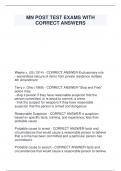Exam (elaborations)
MN POST TEST EXAMS WITH CORRECT ANSWERS
- Course
- Institution
MN POST TEST EXAMS WITH CORRECT ANSWERS Weeks v. US (1914) - CORRECT ANSWER-Exclusionary rule - warrantless seizure of items from private residence violates 4th Amendment Terry v. Ohio (1968) - CORRECT ANSWER-"Stop and Frisk" police may: - stop a person if they have reasonable suspicion t...
[Show more]



